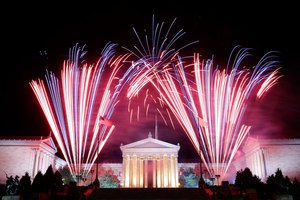
The measure would remove a current restriction on grants and designate parts of the state's fireworks tax revenue for financial and educational aid for first responders
Eric Scicchitano
The Daily Item
HARRISBURG, Pa. — Members of the Pennsylvania House of Representatives voted unanimously this week to approve a bill that could be a major boost to the commonwealth's fire and emergency medical services.
House Bill 1178 , sponsored by state Rep. Jerry Knowles, R- Berks, would allow individual fire and EMS companies involved in a merger to continue to receive grant awards in perpetuity through Pennsylvania's Fire and EMS Grant Program.
The measure proposes to strike a current rule that eliminates individual awards for each company in a merger after 10 years, upon which the collective merged entity would receive a single grant award.
With the House's approval, the bill moved for consideration within the Senate Committee on Veteran Affairs & Emergency Preparedness. The Senate has just seven session days — six in October, one in November — remaining in the current legislative session. The bill would expire and would need to be reintroduced next year if it's not passed into law.
State Rep. Lynda Culver, R- Northumberland/ Snyder, and state Rep. Chris Sainato, D- Lawrence, added amendments that expanded the bill's scope.
Culver's amendment added language seeking to designate portions of Pennsylvania's fireworks tax for financial and educational assistance for first responders: Scholarship grants for reimbursement of EMS training, municipal fire department capital grants for facilities maintenance, capital grants for emergency service training centers, and online training educator and training reimbursement for firefighters.
The bill specifically looks to set the terms for expending funds provided by the recently amended fireworks tax law, Act 74 of 2022, that now directs all revenue from the 12% tax on fireworks sales for fire and EMS supports.
"The dwindling number of emergency responders poses a real threat to public safety and cannot be ignored," Culver said. "We continue to ask more of these talented volunteers while providing them with less and that needs to change."
Pennsylvania is expected to collect approximately $14.8 million in fireworks taxes and license fees annually, according to a fiscal note for the bill that became Act 74 earlier this summer. Under former terms, $2 million would go to emergency services and the rest to the general fund.
The fireworks tax revenue distribution is allocated as follows, according to a fiscal note on House Bill 1178:
The remaining funds are to be equally divided between the EMS Grant Program and the Fire Company Grant Program.
The amendment offered by Sainato seeks to establish the Active Volunteer Tuition and Loan Assistance Program to help emergency services recruit and retain volunteer first responders.
Pennsylvania Higher Education Assistance Agency would administer the program. Volunteers would be eligible on a first-come-first-serve basis each academic year to receive $1,000 for those who are full-time students or $500 for part-time students.
To receive the funds, the volunteers must serve at least one year before enrolling in an academic program and continue active service for at least five years after finishing. A required promissory note would obligate that they repay the funding should they fail to satisfy the requirements.
"A Senate commission report showing that the number of Pennsylvania's volunteer first responders has declined by nearly 90% — from about 300,000 in the 1970s to as few as 38,000 in 2018 — was a wakeup call that we need commonsense, bipartisan solutions to attract young people back to volunteer public safety jobs," Sainato said. "Helping pay their tuition at state schools in exchange for service would be an effective recruiting tool that would ensure an ongoing supply of volunteers.
___
(c)2022 The Daily Item
McClatchy-Tribune News Service
Copyright © 2025 EmsGrantsHelp.com. All rights reserved.
